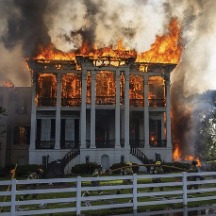Daniel Dyess, an attorney and preservationist and the owner of the now-burned Nottingway Plantation, had insurance. He will get a check from his insurance company and has vowed to rebuild. If he rebuilds, he will own a replica of the work of hundreds of African craftspeople, but with modern marketable nuances.
He will still make money off the African's craftsmanship. He will still own the plantation and still control the narrative. The narrative will stay the same unless his clients' preferences change.
The new craftspeople will likely include a large number of Spanish-speaking workers who will receive pay and enter the marketplace with more purchasing power, enabling them to better compete against Black workers for better housing and other goods and services.
Where does that leave Black people who attended the Notting way-Plantation-is-Burning Cookout? Perhaps with a credit card bill for the groceries purchased for the festivities at Target, of all stores.
When we posted this view on Facebook, we received responses indicating that many of our followers had attended the cookout. However, one of them, housing redeveloper Ethel Rock, added, "You forgot to mention, 'and my insurance rates will go up....and I didn't have anything to do with it.'" Yes, a lot of Dyess' Black neighbors could be subject to higher insurance rates, no jobs at the plantation, and no Go-Fund-Me campaign from those paying off their Nottingway-Plantation-is-Burning Cookout bill.
Dyess told the NY Post, "We are trying to make this a better place. We don't have any interest in left-wing radical stuff. We need to move forward on a positive note here, and we are not going to dwell on past racial injustice."
That is the view of one White man in one tiny Louisiana town, a town that is 95 percent Black and where more than half of the population lives below the poverty line. White Castle is located in the Second Congressional District of Louisiana, represented by Troy Carter. Since 1984, that state has drawn the district as a Black-majority district.
This economic/political scenario reminds me of what former Gary Mayor Richard Hatcher said in Port of Harlem's "Whatever Happened to the Revolution" issue. He said, "There could be no political decisions made in the City of Gary unless there was a Black or Blacks in the room." The problem was that "all the major economic decisions in the city were being made in rooms where there were no Blacks at all. In the end, the economic decisions were far more powerful than the political decisions."
This scenario also reminds me of what Malinda Saunders, co-founder of the first Black Memorabilia Show, used to teach about preserving Black artifacts: "Don't be ashamed of these items. You didn't create them. They were designed to demean us, and they tell our story." The burning of Nottoway Plantation is burning our history and the work of hundreds of Black artisans.
It reminds me of Black Memorabilia dealer and spokesperson Steve Lewis pulling me away from my Black memorabilia booth to go to the venue's door to see the number of White people lined up to enter the now-torn-down Silver Spring, Maryland, Armory well before the event's opening. He was teaching me that Whites will come in first and buy up the best pieces, and Blacks will come in later and ask why all the White collectors and vendors have the best stuff and ask, "Are they racist?"
In reality, White collectors often take Black artifacts more seriously. I have now gotten old enough to witness several times what archivist Ida Jones says about what usually happens when Blacks die: The dumpster comes the next day.
In the Times article "The Burning of Nottoway Plantation," Maurice Carlos Ruffin wrote, "Reconciliation cannot come before recognition and mourning. If Nottoway Plantation had been serving the community it was based in, I'd be the first one devastated by its loss. But as it stands, my face is completely dry."
His face is completely dry, but what about the Blacks who face higher insurance rates and unemployment? Wouldn't it have been better if he had wiped his face with the words of journalist Tony Brown: "If you want freedom, but it?"
Learning from Mayor Hatcher about the power of economics, Ruffin could have focused on business rather than emotional savvy, and saved the work of Black artisans, increased the employment of Black employees at the plantation, changed the narrative, and forged a new economic and social destiny, blazing a trail toward financial freedom.







